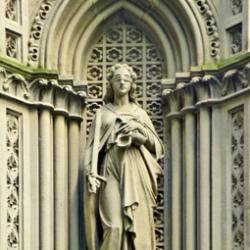
“You shall not pass.”
So says a college professor at this time of the term. . .making what passes for a joke in the professoriate by echoing the great wizard Gandalf facing the Balrog of Moria in Fellowship of the Ring.
Gandalf is very powerful, yet this power often seems missing in other adventures. Is this the same wizard who in other places seems scarcely able to handle goblins and wolves or do much more than produce a light in a dark place?
Has Tolkien created a character with inconsistent powers?
Maybe.
Given that Professor Tolkien put great care into his work, such an assumption about a central character like Gandalf, seems hasty. A moment of consideration might reveal something about the difference between magic and miracle and the workings of nature as described by science.
Tolkien might teach us something important if like the Ents we are not hasty in our conclusions. Magic, understood properly, may be an interaction with a person and so based on the response of the person to our situation.
Magic, in this sense, may be like miracles and not like science. Science gives us a description of the regular behavior of impersonal objects. Drop a staff, the wood falls. This is regular and repetitive. Things like a wood staff are not alive so have only these kinds of responses. They lack the soul one finds in a tree, a dog, or a man.
When one comes to a rational being, an angel, a god, or a man, then one finds a different response. The person can defy our will. Morality enters. We can do as we will to a piece of wood, but not to our neighbor. If there were wizards like Gandalf, they would be in relationship with great Powers, living beings, that have wills of their own. The wizard has a relationship with powerful beings (in the book) and is not doing science.
Gandalf might not be able to do the same things all the time.
Why?
The beings he serves respond and react to the situation in which Gandalf exists. He is given the power needed and since the powers he serves are not the good God, there is no reason to think them “perfect.” In the alternative cosmos Tolkien creates, Middle Earth, the powerful beings Gandalf encounters do not always make the right choices anymore than Gandalf does.
Gandalf trusts Saruman. That was a mistake. He serves great powers that can also make mistakes. That a being is higher in the great chain of being does not make that being omniscient.
My dog Nessie, wonder dog that she is, does what I say: “Fetch the ball.” This has not always turned out well. Sometimes I ask her to fetch, when fetching is not possible. The ball has gone down the drain and neither Nessie nor her (sometimes) more powerful master can get the ball.
So it is with magic in the Lord of the Rings.
Gandalf gets the powers he uses for the situation in which he finds himself.
This may be sufficient or not. If a Balrog comes, then great power surges through Gandalf from his masters. If a wolf comes, then lesser powers come. In the dark, we only need a little light. This is a beautiful image.
Naturally, miracles, the actions of the good God, are like this and also unlike this fictional example. Like magic and unlike science, miracles come when a person, God, acts. The cosmos is interconnected, eternity is before us, and so what seems good to us is not always good for us. God always maximizes goodness, but that can be hard to see.
God weeps with us, but God will not spoil us by giving us what we wish when it is bad for us in the very long term in which God knows we will live. We have eternity to live with God and see the Beatific Vision, so we do not always get the power we think we need.
We are like Gandalf. The Balrogs of our lives may not pass, our friends may escape, but we suffer for our greater happiness.
I am thankful to the faculty and students at Saint Constantine College for a discussion that helped push my thinking. The inchoate parts are my fault, while any clarity is due to them.












